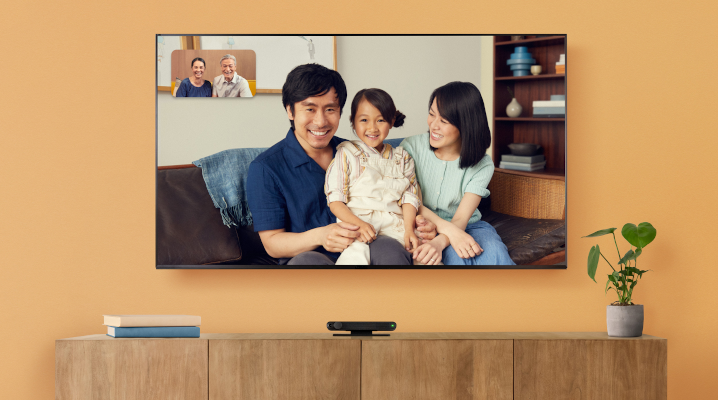 APPS
APPS
 APPS
APPS
 APPS
APPS
Facebook Inc. today expanded its hardware lineup with the introduction of three new Portal video calling devices that bring new communications features as well as better privacy.
The star of the trio is the long-rumored Portal TV (pictured). It’s essentially a sophisticated webcam that users can connect to a television via the HDMI port to turn it into a video calling system. A built-in microphone handles the audio, while an integrated voice assistant allows consumers to perform basic tasks such as calling a contact using spoken commands.
Portal TV doubles as a media streaming device. Facebook will provide access to content from Amazon Prime Video, Showtime, CBS All Access and a number of other content services, with support for even more platforms set to arrive in the future. A July report indicated that the social network had approached Netflix Inc., Walt Disney Co., HBO and Hulu about making their shows available for its users.
Portal TV represents a unique entry into crowded smart speaker market. None of the major players, notably Amazon.com Inc. and Google LLC, have comparable products that work with the user’s TV.
Moreover, the device might even provide a springboard for Facebook to expand into the enterprise side of the communications hardware market. Portal TV only lets users make calls through Messenger and WhatsApp, but the social network could theoretically equip a future model with support for its Workplace by Facebook team collaboration service. Workplace by Facebook has a built-in video calling tool for employee communications.
Portal TV will launch alongside two new editions of the original Portal device. The first features a 10-inch display and will be sold for $179 while the second model, the Portal Mini, offers an eight-inch screen at a more accessible $129 price tag.
All three devices pack privacy improvements meant to make the idea of installing a Facebook camera in the living room more palatable for consumers. There’s a switch that makes it possible to turn off the front lens and microphone or only the former, while a new interface option allows users to opt out of having their call recordings used in human quality assurance reviews.
The major players in the voice assistant market have been transcribing some user interactions to find areas for improvement in their services. Apple Inc., Google, Amazon and Facebook Inc. all paused the practice or revised their operations recently in response to public scrutiny.
Support our mission to keep content open and free by engaging with theCUBE community. Join theCUBE’s Alumni Trust Network, where technology leaders connect, share intelligence and create opportunities.
Founded by tech visionaries John Furrier and Dave Vellante, SiliconANGLE Media has built a dynamic ecosystem of industry-leading digital media brands that reach 15+ million elite tech professionals. Our new proprietary theCUBE AI Video Cloud is breaking ground in audience interaction, leveraging theCUBEai.com neural network to help technology companies make data-driven decisions and stay at the forefront of industry conversations.